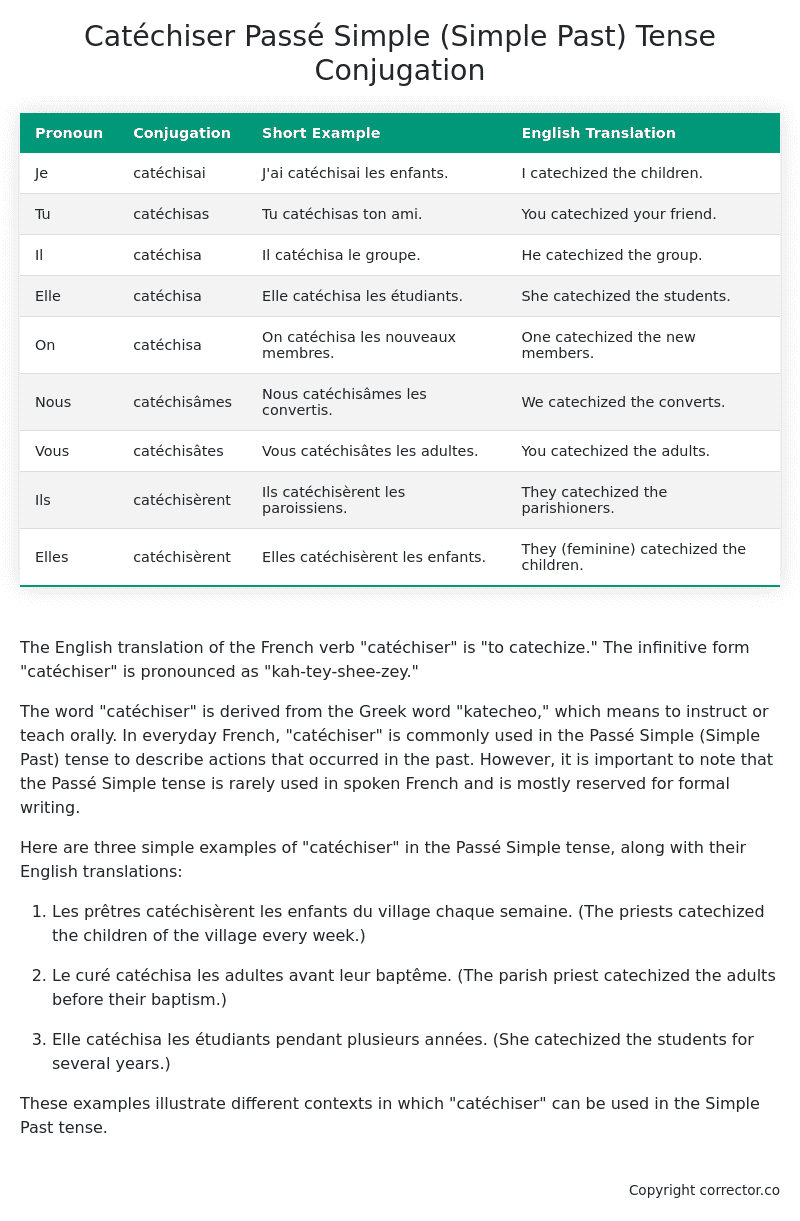Passé Simple (Simple Past) Tense Conjugation of the French Verb catéchiser
Introduction to the verb catéchiser
The English translation of the French verb “catéchiser” is “to catechize.” The infinitive form “catéchiser” is pronounced as “kah-tey-shee-zey.”
The word “catéchiser” is derived from the Greek word “katecheo,” which means to instruct or teach orally. In everyday French, “catéchiser” is commonly used in the Passé Simple (Simple Past) tense to describe actions that occurred in the past. However, it is important to note that the Passé Simple tense is rarely used in spoken French and is mostly reserved for formal writing.
Here are three simple examples of “catéchiser” in the Passé Simple tense, along with their English translations:
-
Les prêtres catéchisèrent les enfants du village chaque semaine.
(The priests catechized the children of the village every week.) -
Le curé catéchisa les adultes avant leur baptême.
(The parish priest catechized the adults before their baptism.) -
Elle catéchisa les étudiants pendant plusieurs années.
(She catechized the students for several years.)
These examples illustrate different contexts in which “catéchiser” can be used in the Simple Past tense.
Table of the Passé Simple (Simple Past) Tense Conjugation of catéchiser
| Pronoun | Conjugation | Short Example | English Translation |
|---|---|---|---|
| Je | catéchisai | J’ai catéchisai les enfants. | I catechized the children. |
| Tu | catéchisas | Tu catéchisas ton ami. | You catechized your friend. |
| Il | catéchisa | Il catéchisa le groupe. | He catechized the group. |
| Elle | catéchisa | Elle catéchisa les étudiants. | She catechized the students. |
| On | catéchisa | On catéchisa les nouveaux membres. | One catechized the new members. |
| Nous | catéchisâmes | Nous catéchisâmes les convertis. | We catechized the converts. |
| Vous | catéchisâtes | Vous catéchisâtes les adultes. | You catechized the adults. |
| Ils | catéchisèrent | Ils catéchisèrent les paroissiens. | They catechized the parishioners. |
| Elles | catéchisèrent | Elles catéchisèrent les enfants. | They (feminine) catechized the children. |
Other Conjugations for Catéchiser.
Le Present (Present Tense) Conjugation of the French Verb catéchiser
Imparfait (Imperfect) Tense Conjugation of the French Verb catéchiser
Passé Simple (Simple Past) Tense Conjugation of the French Verb catéchiser (You’re reading it right now!)
Passé Composé (Present Perfect) Tense Conjugation of the French Verb catéchiser
Futur Simple (Simple Future) Tense Conjugation of the French Verb catéchiser
Futur Proche (Near Future) Tense Conjugation of the French Verb catéchiser
Plus-que-parfait (Pluperfect) Tense Conjugation of the French Verb catéchiser
Passé Antérieur (Past Anterior) Tense Conjugation of the French Verb catéchiser
Futur Antérieur (Future Anterior) Tense Conjugation of the French Verb catéchiser
Subjonctif Présent (Subjunctive Present) Tense Conjugation of the French Verb catéchiser
Subjonctif Passé (Subjunctive Past) Tense Conjugation of the French Verb catéchiser
Subjonctif Imparfait (Subjunctive Imperfect) Tense Conjugation of the French Verb catéchiser
Subjonctif Plus-que-parfait (Subjunctive Pluperfect) Tense Conjugation of the French Verb catéchiser
Conditionnel Présent (Conditional Present) Tense Conjugation of the French Verb catéchiser
Conditionnel Passé (Conditional Past) Tense Conjugation of the French Verb catéchiser
Conditionnel Passé II (Conditional Past II) Tense Conjugation of the French Verb catéchiser
L’impératif Présent (Imperative Present) Tense Conjugation of the French Verb catéchiser
L’impératif Passé (Imperative Past) Tense Conjugation of the French Verb catéchiser
L’infinitif Présent (Infinitive Present) Tense Conjugation of the French Verb catéchiser
L’infinitif Passé (Infinitive Past) Tense Conjugation of the French Verb catéchiser
Le Participe Présent (Present Participle) Tense Conjugation of the French Verb catéchiser
Le Participe Passé (Past Participle) Tense Conjugation of the French Verb catéchiser
Struggling with French verbs or the language in general? Why not use our free French Grammar Checker – no registration required!
Get a FREE Download Study Sheet of this Conjugation 🔥
Simply right click the image below, click “save image” and get your free reference for the catéchiser Passé Simple tense conjugation!

Catéchiser – About the French Passé Simple (Simple Past) Tense
Formation
Usage
Narration
Historical Context
Interactions with other tenses
Passé Composé
Imparfait
Conditional and Subjunctive
Summary
I hope you enjoyed this article on the verb catéchiser. Still in a learning mood? Check out another TOTALLY random French verb conjugation!


